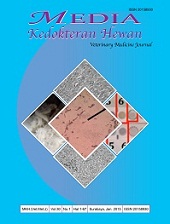Case Report: Multiple Tick-Borne Diseases and Gastrointestinal Protozoal Infection in a Young Poodle Dog
Downloads
Co-infections involving tick-borne diseases (TBD) alongside gastrointestinal protozoans are poorly understood in domestic dogs. This case report examines the occurrence of Babesia sp., Ehrlichia sp., and Anaplasma sp. co-infections with Giardia sp. and Amoeba sp. in a three-month-old female poodle. The owner complained that her dog had yellow vomiting and bloody diarrhea, and refused to eat. A physical examination was performed, revealing lethargy, 4% dehydration, bloody diarrhea, mandibular lymphoglandular swelling, and a Rhipicephalus sanguineus tick infestation in the case dog. The parvovirus antigen rapid test kit yielded negative results, whereas the TBD antibody test kit yielded positive results for Anaplasma sp., Babesia sp., and Ehrlichia sp. Infection with Giardia sp. and Amoeba sp. was detected by native stool examination. The dog had lymphocytosis, monocytosis, granulopenia, hyperchromic normocytic anemia, and thrombocytopenia. The therapy provided was metronidazole and doxycycline combination antibiotics, lactated ringer fluid (RL) therapy, vitamin B complex, Sangobion®, Fufang E'jiao Jiang® (FEJ), ondansetron, vitamin K1, kaolin-pectin, and Hill's Prescription Diet® A/D feed. The therapy showed significant improvement during the 3-day hospitalization, and the dog was declared clinically cured after two weeks of treatment.
Almendros, A., Burchell, R., and Wierenga, J., 2020. An alternative combination therapy with metronidazole, clindamycin and doxycycline for babesia gibsoni (Asian genotype) in dogs in Hong Kong. Journal of Veterinary Medical Science, 82 (9), pp. 1334–1340.
An, H.M., Song, J.H., An, S.J., Yu, D., Han, D., Kim, Y.J., and Jung, D.I., 2019. Clindamycin-doxycycline-metronidazole combination therapy in a refractory canine babesiosis case. Journal of Biomedical Translational Research, 20 (3), pp. 71–74.
Aziz, M.U., Hussain, S., Song, B., Ghauri, H.N., Zeb, J., and Sparagano, O.A., 2023. Ehrlichiosis in Dogs: A comprehensive review about the pathogen and its vectors with emphasis on South and East Asian countries. Veterinary Sciences, 10 (1), pp.21–25.
Bai, L., Goel, P., Jhambh, R., Kumar, P., and Joshi, V.G., 2017. Molecular prevalence and haemato-biochemical profile of canine monocytic Ehrlichiosis in dogs in and around Hisar, Haryana, India. Journal of Parasitic Diseases, 41 (3), pp.647–654.
Barrera, J.P., Miró, G., Carmena, D., Foncubierta, C., Sarquis, J., Marino, V., Estévez-Sánchez, E., Bailo, B., Checa, R., and Montoya, A., 2024. Enhancing diagnostic accuracy: Direct immunofluorescence assay as the gold standard for detecting Giardia duodenalis and Cryptosporidium spp. in canine and feline fecal samples. BMC veterinary research, 20 (1), pp.445.
Batool, A., Zafar, M.U., Abdullah, M., Mumtaz, H., Siddique, S., Sattar, S., and Rana, A., 2022. Comparative effects of spirulina with iron supplemented Sangobion capsules among anemic females in Hafizabad. Pakistan Journal of Medical and Health Sciences, 16 (5), pp. 957–960.
Chirek, A., Silaghi, C., Pfister, K., and Kohn, B., 2018. Granulocytic anaplasmosis in 63 dogs: clinical signs, laboratory results, therapy and course of disease. Journal of Small Animal Practice, 59 (2), pp.112–120.
Ciuca, L., Pepe, P., Bosco, A., Caccio, S.M., Maurelli, M.P., Sannella, A.R., Vismarra, A., Cringoli, G., Kramer, L., Rinaldi, L., and Genchi, M., 2021. Effectiveness of Fenbendazole and Metronidazole against Giardia infection in dogs monitored for 50-days in home-conditions. Frontiers in Veterinary Science, 8, pp.1–7.
Dumler, J.S., Lichay, M., Chen, W.H., Rennoll-Bankert, K.E., and Park, J.H., 2020. Anaplasma phagocytophilum activates NF-κB signaling via redundant pathways. Frontiers in Public Health, 8, 558283.
Dwi, P., Nugraheni, Y.R., Rohayati, E.S., and Prastowo, J., 2018. Babesiosis in a local dog in Yogyakarta, Indonesia, a case report. Research Journal of Parasitology, 13 (1), pp.14–18.
Eichenberger, R.M., Riond, B., Willi, B., Hofmann-Lehmann, R., and Deplazes, P., 2016. Prognostic markers in acute Babesia canis infections. Journal of Veterinary Internal Medicine, 30 (1), pp.174–182.
Fadhil, A.I., Fadel, S.R., and Faraj, A.A., 2021. Conventional and molecular study of Entamoeba spp. in domestic dog’s fecal at Baghdad city, Iraq. Iraqi Journal of Agricultural Sciences, 52 (6), pp.1482–1488.
Faizal, M.D., Haryanto, A., and Tjahajati, I., 2019. Diagnosis and molecular characterization of Anaplasma platys in dog patients in Yogyakarta area, Indonesia. Indonesian Journal of Biotechnology, 24 (1), pp.43–50.
Gal, A., Harrus, S., Arcoh, I., Lavy, E., Aizenberg, I., Mekuzas-Yisaschar, Y., and Baneth, G., 2007. Co-infection with multiple tick-borne and intestinal parasites in a 6-week-old dog. Can Vet J., 48 (6), pp.619–622.
Grüttner, J., van Rijn, J.M., Geiser, P., Florbrant, A., Webb, D.L., Hellström, P.M., Sundbom, M., Sellin, M.E., and Svärd, S.G., 2023. Trophozoite fitness dictates the intestinal epithelial cell response to Giardia intestinalis infection. PLoS Pathogens, 19 (5), pp.1–28.
Hadi, U.K., Soviana, S., and Pratomo, I.R.C., 2016. Prevalence of ticks and tick-borne diseases in Indonesian dogs. Journal of Veterinary Science & Technology, 7 (3), pp.1–7.
Hardiyanti, N., Tiuria, R., and Akbari, R.A., 2023. Diagnostic case study and treatment of giardiasis in cat at Rvet clinic Bogor. Jurnal Riset Veteriner Indonesia, 7 (1), pp.11–17.
Harun, H., Sennang, N., and Rusli, B., 2019. Giardiasis. Healthy Tadulako Journal, 5 (3), pp.1–80.
Hemmati, A., Choopani, A., Pourali, F., Mohammad, S., and Hosseini, J., 2016. Molecular epidemiology and drug resistance study of Entamoeba histolytica in clinical isolates from Tehran, Iran. Journal of Applied Biotechnology Reports Original Article Journal of Applied Biotechnology Reports, 3 (4), pp.513–517.
Huggins, L., Massetti, L., Schunack, B., Colella, V., and Traub, R., 2021. Novel high-throughput multiplex qPCRs for the detection of canine vector-borne pathogens in the Asia-Pacific. Microorganisms, 9 (5), 1092.
Junaidi, 2021. Penyebaran dan risiko penularan Amoeba usus pada manusia dan monyet ekor panjang liar di Kota Sabang Provinsi Aceh. Institut Pertanian Bogor, Bogor, Indonesia.
Kleeb, C., Golini, L., Beckmann, K., Torgerson, P., and Steffen, F., 2021. Canine tick-borne encephalitis: Clinical features, survival rate and neurological sequelae: A retrospective study of 54 cases (1999–2016). Frontiers in Veterinary Science, 8 (782044), pp.1–8.
Li, X., Xu, X., Dong, Y., Fan, S., Wang, X., Song, R., Shan, D., Lv, F., Zhong, X., Deng, Q., Li, X., He, Y., Zheng, Y., Xia, Q., Zhang, Y., and She, G., 2023. Fufang E’jiao Jiang’s effect on immunity, hematopoiesis, and angiogenesis via a systematic “compound-effect-target” analysis. Food Science and Human Wellness, 13(5), pp.2813–2832.
Li, Y., Ma, D., Li, D., and DuLuo, P.S., 2018. Clinical observation on compound Ejiao syrup for treatment of postpartum anemia. Journal of Guangzhou University of Traditional Chinese Medicine, 35 (4), pp.599–605.
López-Arias, Á., Villar, D., López-Osorio, S., Calle-Vélez, D., and Chaparro-Gutiérrez, J.J., 2019. Giardia is the most prevalent parasitic infection in dogs and cats with diarrhea in the city of Medellín, Colombia. Veterinary Parasitology: Regional Studies and Reports, 18(2019), 100335.
Maheshwarappa, Y.P., Patil, S.S., Swapna, C.R., Chandrashekarappa, M., Kotresh, A.M., and Pradeep, B.S., 2020. Therapeutic management of Ehrlichiosis in German shepherd dog: A case reports. International Journal of Current Microbiology and Applied Sciences, 9 (3), pp.2440–2444.
Mohammed, E.S., El-Dakhly, K.M., Elkamshishi, M.M., and Elmajdoub, L.O., 2021. An alternative combination therapy with metronidazole and doxycycline for babesiosis and theileriosis in stray dogs. Article in Egyptian Veterinary Medical Society of Parasitology Journal, 17 (1), pp.51–70.
Mylonakis, M.E., Harrus, S., and Breitschwerdt, E.B., 2019. An update on the treatment of canine monocytic Ehrlichiosis (Ehrlichia canis). The Veterinary Journal, 246 (2019), pp.45–53.
Mylonakis, M.E., Koutinas, A.F., Baneth, G., Polizopoulou, Z., and Fytianou, A., 2004. Mixed Ehrlichia canis, Hepatozoon canis, and presumptive Anaplasma phagocytophilum infection in a dog. Vet Clin Pathol, 33 (4), pp.249–251.
Mylonakis, M.E. and Theodorou, K.N., 2017. Canine monocytic Ehrlichiosis: an update on diagnosis and treatment. Acta Vet Beograd., 67 (3), pp.299–317.
Ngui, R., Hassan, N.-A., Nordin, N.M.S., Mohd-Shaharuddin, N., Chang, L.Y., Teh, C.S.J., Chua, K.H., Kee, B.P., Hoe, S.Z., and Lim, Y.A.L., 2020. Copro-molecular study of Entamoeba infection among the indigenous community in Malaysia: A first report on the species-specific prevalence of Entamoeba in dogs. Acta tropica, 204, 105334.
Nurullah, F.R.J., Murtiningrum, F.S., Rahmiati, D.U., Manalu, W., and Noviana, D., 2023. Studi kasus gallbladder mucocele disertai ehrlichiosis pada anjing Beagle. Acta Vet Ind., 11 (3), pp.250–260.
Otranto, D. and Wall, R., 2024. Veterinary Parasitology 5th Edition. USA: Wiley Blackwell.
Perayadhista, N.M.D., Suratma, N.A., and Dharmawan, N.S., 2022. Deteksi infeksi Anaplasma sp., Borrelia burgdorferi dan Ehrlichia sp. pada anjing yang terinfestasi caplak di Kota Denpasar. Buletin Veteriner Udayana, 14 (5), pp.558–571.
Peruzzo, A., Vascellari, M., Massaro, A., Mancin, M., Stefani, A., Orsini, M., Danesi, P., Petrin, S., Carminato, A., Santoro, M.M., Speranza, R., Losasso, C., and Capelli, G., 2023. Giardia duodenalis colonization slightly affects gut microbiota and hematological parameters in clinically healthy dogs. Animals, 13 (6), 14.
Plumb, D.C., 2011. Plumb’s veterinary drug handbook. 7th Edition. Iowa: Blackwell Publishing.
Pradnyantari, A.A.S.I., Suartha, N., Erawan, G.M.K., and Mahardika, G.N.K., 2019. Deteksi Anaplasma sp. pada anjing di bali secara klinis, serologis, dan molekuler. Jurnal Veteriner, 20 (4), pp.479–485.
Remesar, S., Arnal, J.L., Gómez, A., Prieto, A., García-Dios, D., Benito, A., Panadero, R., Morrondo, P., and Díaz, P., 2022. A case report of fatal feline babesiosis caused by Babesia canis in north western Spain. BMC Veterinary Research, 18 (177), pp.1–5.
Ryan, U. and Zahedi, A., 2019. Molecular epidemiology of giardiasis from a veterinary perspective. Advances in parasitology, 106, pp.209–254.
Solano-Gallego, L., Sainz, Á., Roura, X., Estrada-Peña, A., and Miró, G., 2016. A review of canine babesiosis: The European perspective. Parasites and Vectors, 9, 336.
Springer, A., Glass, A., Probst, J., and Strube, C., 2021. Tick-borne zoonoses and commonly used diagnostic methods in human and veterinary medicine. Parasitol Res., 120 (12), pp.4075-4090.
Suartha, I.N., Pradnyantari, A.A.S.I., Erawan, I.G.M.K., and Mahardika, I.G.N.K., 2023. Clinical observations, hematological profile, serological testing, and molecular detection of Erlichia canis in veterinary clinics in Bali, Indonesia. International Journal of Veterinary Science, 12 (1), pp.70–75.
Sukara, R., Andrić, N., Andrić, J.F., Mihaljica, D., Veinović, G., Ranković, V., and Tomanović, S., 2023. Autochthonous infection with Ehrlichia canis and Hepatozoon canis in dogs from Serbia. Veterinary Medicine and Science, 9 (1), pp.111–118.
Thongsahuan, S., Chethanond, U., Wasiksiri, S., Saechan, V., Thongtako, W., and Musikacharoen, T., 2020. Hematological profile of blood parasitic infected dogs in Southern Thailand. Veterinary World, 13 (11), pp.2388–2394.
Uiterwijk, M., Nijsse, R., Kooyman, F.N.J., Wagenaar, J.A., Mughini-Gras, L., and Ploeger, H.W., 2019. Host factors associated with Giardia duodenalis infection in dogs across multiple diagnostic tests. Parasites and Vectors, 12 (556), 1.
Widyanjaya, A.A.G.F., Widyasanti, N.W.H., Widyastuti, S.K., and Soma, I.G., 2022. Treatment of anaplasmosis and babesiosis with doxycycline antibiotic, tonicum, and hemapoeticum Chinese herbal in a mongorel dog: A case report. Indonesia Medicus Veterinus, 11 (5), pp.2477–6637.
Widyasanti, N.W.H., Putra, I.P.C., and Suwiti, N.K., 2025. Case report: Ehrlichiosis and anaplasmosis in timber wolf crossbreed (Canis lupus) in Bali, Indonesia. Media Kedokteran Hewan, 36 (1), pp.88-99.
Wongtawan, T., Sontigun, N., Boonchuay, K., Chiawwit, P., Wongtawan, O., Hayakijkosol, O., and Boonhoh, W., 2024. Improvements in blood profiles of canines naturally infected with triple blood pathogens (Babesia vogeli, Ehrlichia canis, and Anaplasma platys) subsequent to doxycycline monotherapy. Animals, 14 (24). 3714.
Wuhan, Y.O.P., Haryanto, A., and Tjahajati, I., 2020. Molecular characterization and blood hematology profile of dogs infected by ehrlichia canis in Yogyakarta, Indonesia. Biodiversitas, 21 (7), pp.3242–3248.
Yang, F., Lai, J., Deng, J., Du, J., Du, X., Zhang, X., Wang, Y., Huang, Q., Xu, Q., Yang, G., Zhang, Y., Zhou, X., Zhang, X., Yuan, Y., Zhang, C., and Wu, J., 2023. The application of ethnomedicine in modulating megakaryocyte differentiation and platelet counts. International Journal of Molecular Sciences, 24 (4), pp.1-23.
Zhang, L., Xu, Z., Jiang, T., Zhang, J., Huang, P., Tan, J., Chen, G., Yuan, M., Li, Z., Liu, H., Gao, D., Xiao, L., Feng, H., Xu, J., and Xu, H., 2021. Efficacy and safety of Ejiao (Asini Corii Colla) in women with blood deficient symptoms: A randomized, double-blind, and placebo-controlled clinical trial. Frontiers in Pharmacology, 12 (718154), pp.1–8.
Zygner, W., Gójska-Zygner, O., Bartosik, J., Górski, P., Karabowicz, J., Kotomski, G., and Norbury, L.J., 2023. Canine babesiosis caused by large Babesia species: Global prevalence and rizk factors-a review. Animals, 13 (16), pp.1-43.
Copyright (c) 2025 I Putu Cahyadi Putra, Yeocelin Meida Meida, Ni Wayan Helpina Widyasanti

This work is licensed under a Creative Commons Attribution-ShareAlike 4.0 International License.

Veterinary Medicine Journal by Unair is licensed under a Creative Commons Attribution-ShareAlike 4.0 International License.
1. The Journal allows the author to hold the copyright of the article without restrictions.
2. The Journal allows the author(s) to retain publishing rights without restrictions
3. The legal formal aspect of journal publication accessibility refers to Creative Commons Attribution Share-Alike (CC BY-SA).





11.jpg)







11.png)













